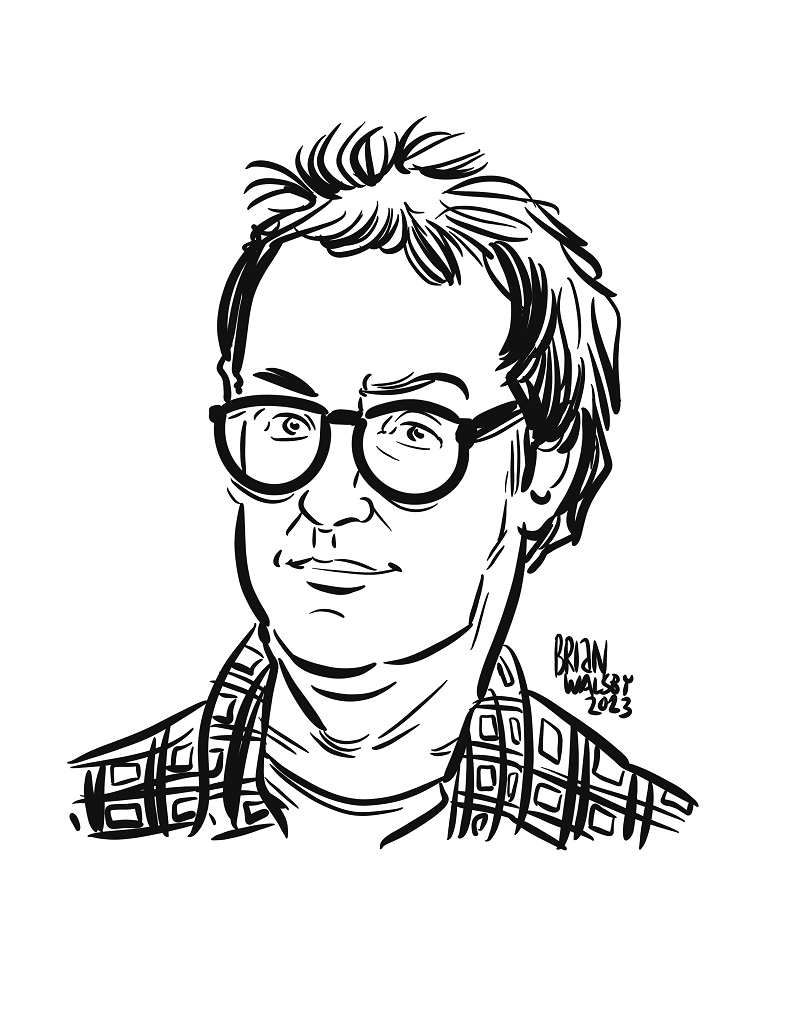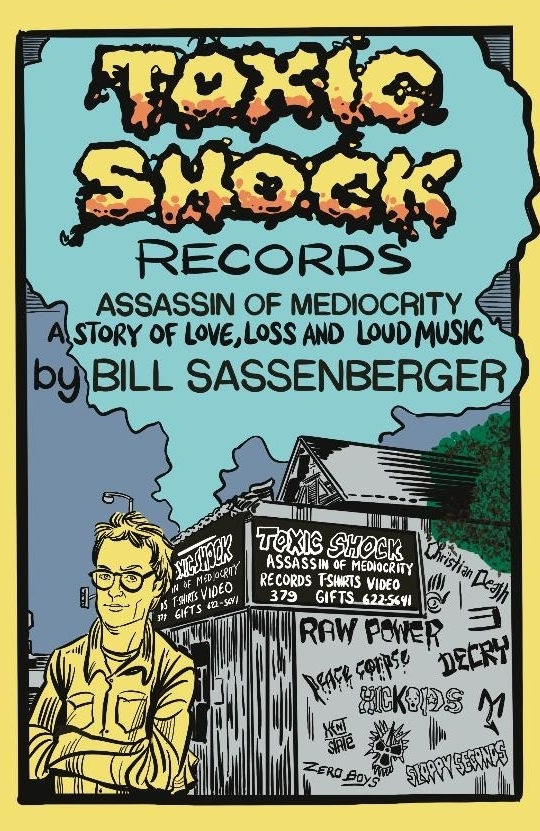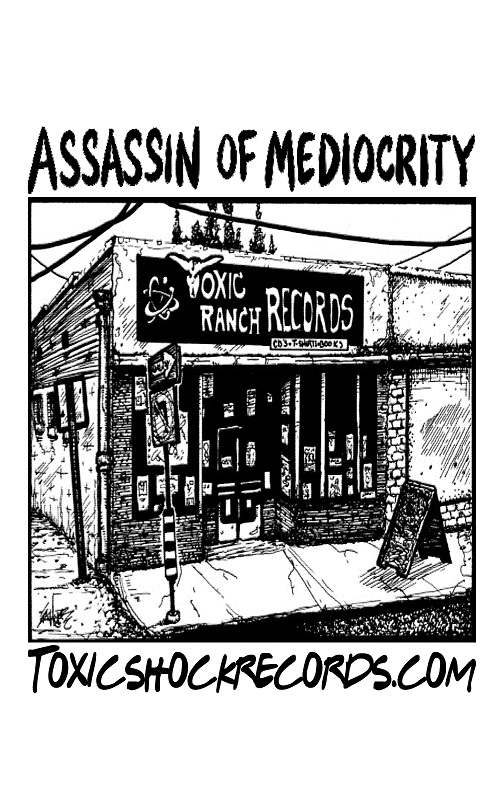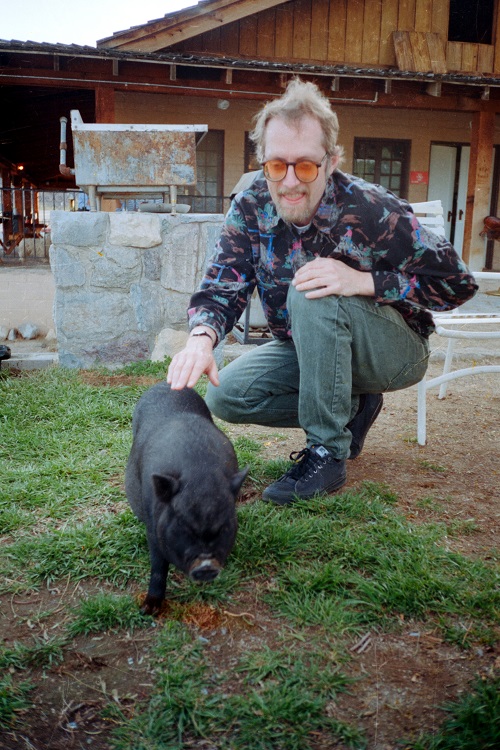About the author:
Bill Sassenberger was born in Springfield IL and was driven west like a tumbleweed, until he was wedged between rocks in Tucson AZ and settled down. His first book is TOXIC SHOCK Assassin of Mediocrity “A Story of Love, Loss and Loud Music”, published by Fluke.
Bill Sassenberger and his late wife Julianna Towns were the proprietors of Toxic Shock Records, which operated its gloriously weird store and record label at various Pomona locations from 1980 to 1988, before decamping to Tucson, Arizona where it became vital for a whole new group of outsider music fans up until its 2014 closure. Today, Bill lives in Tucson and enjoys spending his spare time traveling, collecting gimcrack and eating broccoli.

Toxic Shock Assassin of Mediocrity book reviews:
This is the story of unflagging love-for music, for a partnership forged in passion and steel, for a life chosen, not imposed. Bill Sassenberger, owner of Pomona's Toxic Shock and friend and mentor to hundreds of music aficionados, writes with honesty and without self-aggrandizement about the adventure he shared with Julianna Towns, a brilliant beauty who walked into his record store and never left. Together they nurtured musicians, started their own record label, and explored the world, even when Julianna became confined by a series of strokes at an early age. Their love story intertwines with the history of punk rock and the musical revolution that was spawned from that in a book that will expand minds and break hearts. Janet Brown (Pacific Rim travel author)

Random Notes (by David Ensminger)
More and more, I consider memoirs and folk histories to be the backbone of long-term punk consciousness. I am not talking about vapid nostalgia -- cookie cutter monologues about there and then, or mere exercises in Xeroxed memory flashbacks, like I did x, y, and z -- but books with idiosyncrasies, novel precepts, or art of the tongue. And Toxic Shock does deliver because it has a framing device that is about tender love and huge loss, the suffering and joys of Bill's wife Julianna, whose debilitating strokes shed as much light on medical procedures, rehabilitation ins and outs, and the insufferable insurance system as much as it spells out the quirky nature of marriage, mutually casted spells, business partnership, and adventures through disparate cities, ever-changing music, and the notion of loyalty.
That complex and layered adult vision is the cocoon in which the record store/label/distro narrative becomes a kind of homage to ways of living and being. Yes, Bill has an incredible brainpan, full of endless micro memories, snapshots (like poor impressions, with good reasons, of Christian Death, Misfits, and side note GG Allin) and factoids, but brief glimpses of Julianna's prose, and reviews of her music, offer resonant wordplay, transgressive poetry (when describing Peace Corpse), and artful asides. Bill spins an economic/pared-down sense of telling a story, breezy and to the point, though he does lavish some writerly description on gig experiences like Black Flag, Butthole Surfers, and seeing Meat Puppets in the buzzing darkness of an arid Arizona night. In all, he is a man of habit, despite changing eras, locales, and trends. That is, his conscience and politics follow him closely, whether leading him into the arms of the Yippies or the actions of Earth First.
He has an affection for outsiders, especially of the searing, unique, and off-the-wall TX variety. Though his label features the raucous Hickoids, the legacy of Legionnaires Disease, Dicks, Big Boys, Really Red, and even Culturcide made an imprint as well. Though, like Dischord, he tended to the backyard music of locals like Modern Industry, he ended up channeling us the music of far-flung groundbreakers like Zero Boys and Raw Power, whose 1998 tour diary offers both bleak and grim elements, like ABC No Rio, but also many funny anecdotal moments, like Bill getting fast food pasta in front of burger munching Italians!
And, despite all the flagrant noise and commotion of punk, he highlights the even bigger impressions of seeing Clifton Chenier and Etta James while living for a short hiatus in the French Quarter district of New Orleans. Overall, it's a dizzying tale of a life in music, from all angles, even radio, and it exposed me to new pockets, like the gigs at PAL in Pomona, an old boxing gym, and will make me lend my ear to bands I previously bypassed, like House of Large Sizes and Hullabaloo. Plus, little details matter. His 'fascination' with WW2, or his impressions of world travel, or the crushing moments of coping with an elderly mom, a spreading fire that disrupted home life, and the death of beloved siblings.
By all accounts, this is by no means a simple rock’n’roll immersion: it is a life maze, a series of circles (like endless Raw Power tours, some of the most vivid pages!), a zigzagging tunnel through oral recollections, offhand diaries, remembrances fine and faded. In it, you find hope, consolation, loss, commitment, and work. What is missing, luckily, is self-absorbed ego trips, pompous attitude, or straight-up cynicism. Bill is not that kind of guy. It's the story of being supremely uncool and cool at the same time.
We only crossed paths, once, ever, kind of. When Raw Power hit the Wandering Goat, in Eugene, OR, I was fervently using my own punk history to shape a folklore degree at Univ of Oregon, and I arrived at the coffee shop minutes too late, after dining with my hard-working wife. I was depressed, stunned. I had owned their thin T-shirt since 1987, yet I would have to wait until 2014 (when I interviewed them for Maximum Rocknroll) to witness their nimble ferocity. But in those brief seconds, as I scanned the nearly empty space, wondering what the fuck just happened, why did the bands play so early, I now know Bill was there. We were two ships in the night.
And I know this book will appeal beyond the rank and file of the underground music brethren we both call our family, so check it out.

‘Assassin of mediocrity’ indeed
Bill Sassenberger may not be a household name, but he’s a figure of much importance, reverence even, to folks of a certain age — say from 45 to 65 — who were musical adventurers in their youth. Sassenberger and his late wife Julianna Towns were the proprietors of Toxic Shock Records, which operated its gloriously weird store and record label at various Pomona locations from 1980 to 1988 before decamping to Tucson, Arizona, where it became vital for a whole new group of outsider music fans
